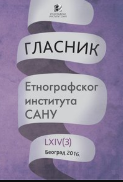‘You Can’t Weed Out Corruption’: Railway Workers’ Assessments of the State in Post-Socialist Serbia
‘You Can’t Weed Out Corruption’: Railway Workers’ Assessments of the State in Post-Socialist Serbia
Author(s): Ognjen KojanićSubject(s): Business Economy / Management, Economic history, Labor relations, Cultural Anthropology / Ethnology, Post-War period (1950 - 1989), Socio-Economic Research, Corruption - Transparency - Anti-Corruption
Published by: Етнографски институт САНУ
Keywords: corruption; the state; railway workers; managers; Serbia;
Summary/Abstract: In this article, I analyze how railway workers in a small town in Serbia assessed what they perceived as the proliferation of corrupt practices in their company and in the state. Corruption has been both a response to the changes of socioeconomic relations and constitutive of those changes. Narratives about corruption reveal the material bedrock of socioeconomic changes since the 1980s as well as the work that people have to invest in making sense of and adapting to those changes. The state figured explicitly and implicitly in these narratives as an object of criticism. Over the past three decades, the Serbian state has changed as much from above—due to transnational pressures and economic problems it was facing—as from below—through practices of individuals enmeshed in state structures. The collapse of state provision and increasing social inequality made corrupt practices crucial for ensuring redistributive state functions and creating new avenues for capital accumulation. In these circumstances, some corrupt practices (such as smuggling) are seen as necessary while others (such as the mismanagement of the company) are condemned as superfluous or outright criminal based on the difference between basic material provision and one’s enrichment to the detriment of others.
Journal: Гласник Етнографског института САНУ
- Issue Year: LXV/2017
- Issue No: 1
- Page Range: 47-63
- Page Count: 17
- Language: English

